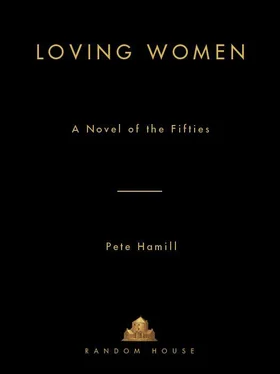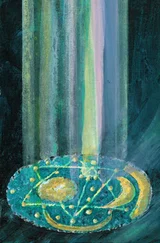Somewhere in the South, the woman from the bus was walking along a street or driving a car or shopping in a market. She was naked in a shower. She was lighting a Lucky and smoking it quickly, holding the butt in her left hand. She didn’t know how desperately I wanted her. How I wanted her promise of female darkness and secret things in the night. How I wanted to know what she knew. But I was in the Navy. The Navy brought me South. Because of the Navy, I was on that bus. And before I could get to her, before I could start my search for her (locating mysterious Palatka on a map and going toward it the way desperate men once searched for El Dorado) I would have to deal with the Navy. And that turned out to be not very hard.
After breakfast, I walked into the Supply Shack and waiting for me at the counter was a first-class airman storekeeper named Donnie Ray Bradford. Not Donald. Or Don. Donnie Ray . He was a thin-lipped man in crisp tailor-made dungarees. His eyes were watery, with a wounded look in them. I told him who I was and he said “Welcome aboard” and then I joined a dozen other sailors at 0800 for the formal morning muster. This was to be the routine of every Pensacola morning, and it is built into me now; no matter where I am or who I sleep with, if I fall asleep at five A.M., I still rise to make the eight o’clock muster. On this first morning, Donnie Ray called each of our names, checked them off a muster sheet, then nodded in a generalized way at the group, dismissing us. It was very loose and casual and, I thought, grown up. A few shook my hand and welcomed me aboard, then quickly dispersed to various parts of the building. Some left to take a truck to Mainside. I remember all of them now, and will carry them with me to the grave, but that first morning, I still couldn’t match names to faces.
Donnie Ray took me on a tour of the Supply Shack. As I thought, the storeroom was in the rear, with crates stacked almost to the ceiling and narrow aisles running between them. A Hi-Lo was parked near the door. Inside the crates there were rotor blades, Donnie Ray told me, and engines and pontoons. They were all up on pallets to make it easier for the prongs of the Hi-Lo to lift them and also to guard against flooding. Sometimes the Gulf was hit with hurricanes. He explained the parts numbering system and told me twice that it was important to account for every piece. “If you forget something,” he said, “they go nuts in Washington.”
He showed me my desk, which was the last in a row of five desks set at right angles to the wall. There were neat trays of requisition forms, a dictionary, a telephone. “All yours,” Donnie Ray said. “The complete aviation storekeeper’s kit.” And then someone called his name and told him he had a phone call and he hurried away. I sat down at the desk. It wasn’t the same as operating twin.50s on a destroyer in the South China Sea. But it was mine. The place where I would work for a long time. I sat back, engulfed by the aroma of cut grass, the fronds of the palm trees clattering in the soft breeze, the sprinklers whirring. Even inside the Supply Shack, the air seemed thick and sensual. A picture of my lost woman scribbled across my mind, then vanished.
Through the screened window, I could see sailors in white hats walking in pairs in the distance, and more white-painted wooden buildings, and then the main administration building, all brick with white trim, rising three stories out of a plaza, a control tower on top, its wide windows made of green-tinted glass. Thinking: I’m here. On the first morning of a new life. This is. New York was. I found myself breathing the thick air as if it were food.
Donnie Ray Bradford came back. His face looked troubled but he said nothing and began to explain what I would be doing. Filling out requisitions for re-supply. Servicing the mechanics and electronics’ mates and even an occasional pilot. “We call them customers,” he said, “though they don’t pay for a damned thing.” They came here to the Supply Shack for their parts or for new tools. And they would wait to be served at the long wide counter at the front of the building. Usually they would have their requisition slips filled out, approved by a superior. “But they might not always have the numbers right,” Donnie Ray said. “So you’ll have to double-check the numbers in the book.” It wasn’t all tedious detail; there were housekeeping chores too. The storekeepers cleaned the Supply Shack once a day, swabbing it down on a rotating basis. And we weren’t imprisoned in this building; sometimes we had to go to Mainside on a truck to pick up new supplies. A bunch of the crew was over there now.
“You gotta watch this weather, too,” he said. “You think ’cause it’s Florida it’s always hot, like yesterday, today. But it sometimes gets goddamned cold. These big storms come down from Canada and take half of damned Alabama with them. Most of the time it’s too hot. All the time it’s too damp. So you gotta keep parts dry and clean. Otherwise they end up little blobs of rust. And get all the numbers right on the forms. You get one digit wrong, you end up with a jeep instead of a screwdriver …”
His voice was soft, but there was an edge underneath. It was as if he was reciting a set speech and had something else on his mind. He said other things; I didn’t really hear them all. I felt blurred. Ready for the sleep I’d missed while guarding my dumpster.
“You got a driver’s license, right?” he said.
“No, I don’t, Donnie Ray.”
“Really? How come?”
“I don’t know how to drive.”
He looked surprised. “You don’t know how to drive ?”
“Never learned.”
“Hell, everybody knows how to drive.”
“We didn’t have a car in our family,” I said, already tired of the old explanation. “Nobody had cars where I grew up. So there was nobody to learn from.”
Besides, I wanted to say, but didn’t: I’m the oldest son. My father was born in Ireland and my mother’s dead and I’m the first American. I had to learn the American things first. Baseball and football. Sugar Ray Robinson. And Batman and The Spirit and Sheena, Queen of the Jungle . And Charlie Parker late at night on Symphony Sid . I guess I’ll have to learn to drive, too, I wanted to say, but didn’t.
“Well,” Donnie Ray Bradford said, “you can load and unload till you get a license.” He glanced out a window at a lone sailor, then back to me. “Someone around here’ll teach you.”
He said all this in a quiet, even tone. No redneck bullying. None of Red Cannon’s malignant style. He talked to me as if I were a man, not a slave, not an inferior, not a boy. He ended by repeating, “Welcome aboard, sailor.” I liked him for that. I liked him a lot. He went off to use the phone again. Then another sailor came over. His name was stenciled above the pocket of his shirt: Harold R. Jones. A second-class storekeeper on his second hitch. He had lank blond hair that lay flat on his skull. Wary eyes. Dungarees so heavily starched they looked as if they’d crack when he walked. He was holding a requisition slip.
“Gimme a hand,” he said casually.
“Sure.”
We went into the back room together, and he led the way to a long flat crate that contained a rotor blade.
“Donnie Ray looks nervous,” I said. “He always that way?”
“Yeah, he’s a bit of a nellie,” Jones said. “But he’s extra nervous today. We got a missing sailor. Jimmy Boswell didn’t make muster. He’s Donnie Ray’s big buddy.”
“You mean he’s AWOL?”
“Who knows? I’m sure Donnie Ray didn’t report him yet. He just don’t know what the skinny is on Ole Boz. The man likes his whiskey, so maybe he got himself in a nice little car wreck somewhere. Nobody knows. Donnie Ray called the hospitals. But nothin turned up yet. Here, grab that end …”
Читать дальше












